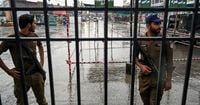Pakistan has launched a large-scale retaliatory military campaign following accusations that India fired missiles at its key military bases. On May 10, 2025, Lieutenant General Ahmed Sharif Chaudhry, a spokesperson for the Pakistani military, stated that India had indeed launched missiles targeting important installations, although most were successfully intercepted. He noted that the attacks included strikes on the Nur Khan Air Base, Shorkot Air Base, and Murid Air Base, all of which were thwarted by Pakistani defenses. Additionally, Chaudhry mentioned that India had also deployed missiles and drones into Afghanistan.
Pakistan's air defense system reportedly intercepted cruise missiles aimed at the Rafiqui Air Base in Shorkot, preventing any damage. Following these developments, the Pakistani military announced the commencement of "Operation Bunyanun Marsoos," a retaliatory operation named after a Quranic phrase meaning "the wall that cannot be broken." This operation was initiated as a direct response to what Pakistan termed as Indian aggression.
On the morning of May 10, the Pakistani military reported that a BrahMos missile storage area was destroyed in Bias, and they claimed to have targeted several locations in India, including Pathankot Airport and Udhampur Air Base, which are known to be used for launching missiles into Pakistan. Witnesses in Indian cities such as Amritsar and Jammu reported hearing multiple explosions, indicating the severity of the conflict.
In response to the escalating tensions, the Pakistan Airport Authority (PAA) announced the closure of its airspace to all flights starting at 3:15 a.m. local time on May 10, which will remain in effect until noon. This decision was taken as a precautionary measure amidst the ongoing military operations.
Prior to these events, on May 9, Pakistani Defense Minister Khawaja Asif had declared that Islamabad had "no choice but a full-scale war" to respond to India's actions over the preceding four days. He condemned the Indian military's missile strikes as acts of aggression. Pakistani Prime Minister Shehbaz Sharif also weighed in, warning that India would face serious consequences for its airstrikes.
The immediate chain of events began on May 7, when the Indian military conducted strikes on locations in both Pakistan and Pakistan-controlled Kashmir, resulting in at least 31 deaths, including children, and injuring over 57 others. India justified its military action as a response to a terrorist attack in Indian-controlled Kashmir on April 22, which claimed the lives of more than 20 individuals, primarily tourists.
The conflict has escalated dramatically, with both nations trading accusations of military aggression. On May 9, India and Pakistan continued to accuse each other of conducting new military attacks involving drones and artillery, marking the third consecutive day of fighting in what has been described as the most serious conflict between the two nations in nearly three decades. The situation has raised concerns not only for the two countries involved but also for the stability of the entire region.
As the situation deteriorates, international calls for restraint have emerged. The foreign ministers of the G7 countries, which include Canada, France, Germany, Italy, Japan, the United Kingdom, and the United States, along with the European Union, issued a joint statement urging both India and Pakistan to exercise "maximum restraint" and to engage in immediate de-escalation. They expressed deep concern for the safety of civilians on both sides and emphasized the urgent need for direct dialogue to achieve a peaceful resolution.
Videos circulated online depict smoke and flames rising near the Margalla Hills and Chaklala area of Rawalpindi, close to military facilities in Islamabad, and at least three explosions were reported throughout the capital. Social media reports suggest that Indian UAVs were involved in the attacks, with some being shot down by Pakistani forces.
In light of these developments, the Pakistani government issued a statement on X, declaring that "New Delhi must now prepare for Islamabad's response. Pakistan's armed forces are fully prepared to defend the homeland, airspace, and national security." This statement underscores the heightened tensions and the readiness of the Pakistani military to respond to perceived threats.
The ongoing hostilities have not only strained relations between India and Pakistan but have also raised alarms regarding the potential for a broader conflict in a region already marked by historical tensions. As both nations remain nuclear-armed, the international community watches closely, hoping for a resolution that avoids further escalation.
In summary, the current conflict between India and Pakistan represents a significant escalation in hostilities, with both nations engaged in military operations and retaliatory strikes. The situation remains fluid, and the potential for further violence looms large as diplomatic efforts seek to de-escalate tensions.




